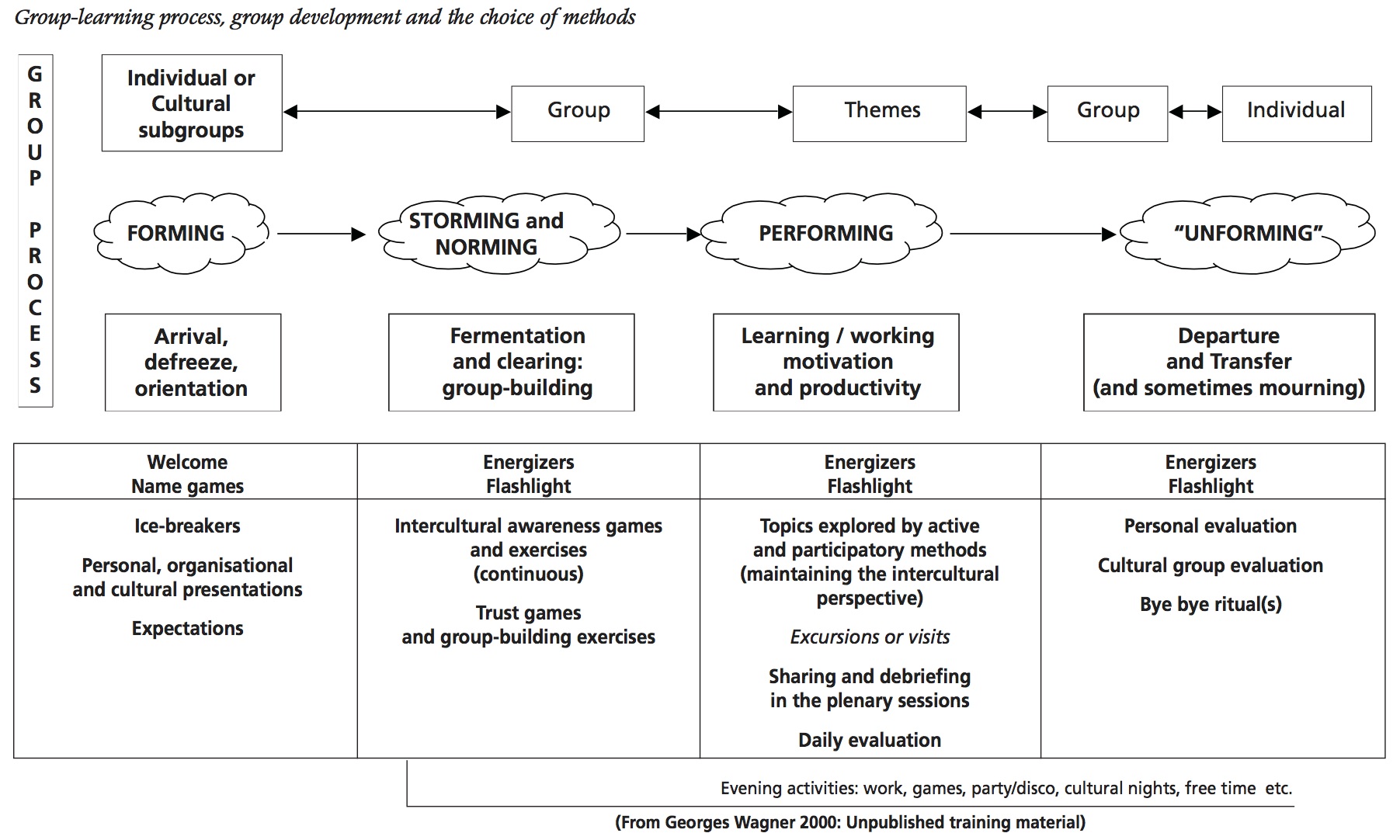1
Facilitating group dynamics
Facilitating group dynamics
Informazioni
Every learning group is different. However, models based on the observation of groups argue that there are typical stages of group development which are likely to be passed through.
Watch the below video, which explains one of those models, developed by Bruce W. Tuckman.
Essentially, learning facilitators as a team should be aware of different stages and support the group in functioning as constructively as possible to enable individual and group learning.
Step 1
Go through the following statements borrowed from Cherry on the Cake, SALTO-YOUTH publication and critically think about what is perhaps false or missing in the cases expressed below:
- “We did our two sessions of group building. It all went well! It’s all smooth sailing from now on.”
- “Our group is getting along so well! I think this storming business is fake news!”
- “Help! Our group is stuck at the storming level. No one seems to be talking to anyone else and some of them were even insulting each other!”
- “We are almost at the end of the training and the group does not seem connected at all! What can we do about it?”
- “Our group is working so well together! Our street campaign is coming along smoothly and everyone is just so happy about it!”
- “Our training is coming to an end. Participants are so sad to be leaving tomorrow. We just can’t do additional activities – that would make them even more miserable!”
Step 2
Think of your experiences of being a participant or a facilitator of international group activities. Reflect and recognise group development stages and list specific interventions, methods and activities that facilitators applied to facilitate group dynamics.

Go to the badge and submit evidence to showcase your learning and understanding of how to facilitate group dynamics.
The Awero organisation created this educational resource and activity for the Erasmus+ Accreditation training for youth workers.
This activity supports youth workers' competence development in the "Facilitating learning" area. Activity content and badge issuing criteria aligned with the European Training Strategy (ETS) competence model for youth workers to work internationally:
- Knowledge of group processes, mechanisms and principles (including privilege and power relations)
- Skill of identifying dimensions and stages in group processes
- Ability to generate conditions where group members can show and build solidarity within the group
Want to endorse (?) our organisation, this activity and/or badge - send us an email! Contact us at info@awero.org for further questions.
Ottieni badge per l'attività
Facilitating group dynamics Ottieni questo badge
Badge earner got familiar with the group development stages model. By earning this badge, a person demonstrates the ability to identify specific individual and group needs in a specific stage. A person knows and understands the role of a facilitator and what they can do in facilitating group dynamics.
To get this badge, youth worker:
- familiarised with the group development model;
- reflected on individual and group needs in particular development stages;
- elaborated ideas for interventions, methods and activities that facilitators can do to facilitate group dynamics.
Activity content and badge issuing criteria aligned with the European Training Strategy (ETS) competence model for youth workers to work internationally.
Learning duration: 1 hour 30 mins.
Attività
Task n.1
Prova verificata da: un organizzatore dell'attività
Familiarise with the group development model. To earn this badge, complete two tasks below and upload evidence:
- Choose at least one group development stage and identify specific individual and group needs that learners have in the particular stage.
- Suggest 2-3 interventions, methods or activities which facilitators can use to facilitate the group dynamics in a specific stage.
Competenze
#Knowledge of group processes, mechanisms and principles (including privilege and power relations)
#Skill of identifying dimensions and stages in group processes
#Ability to generate conditions where group members can show and build solidarity within the group
Organizzatori
Nectarus
Awero gestisce questa piattaforma web e continua a svilupparla in partnership con organizzazioni leader nel settore dell'educazione. La prima versione di questa piattaforma è stata realizzata grazie ai cofinanziamenti del programma Erasmus+ dell'Unione Europea. Contattaci all'email support@awero.org
Piattaforma
Cambia lingua:

